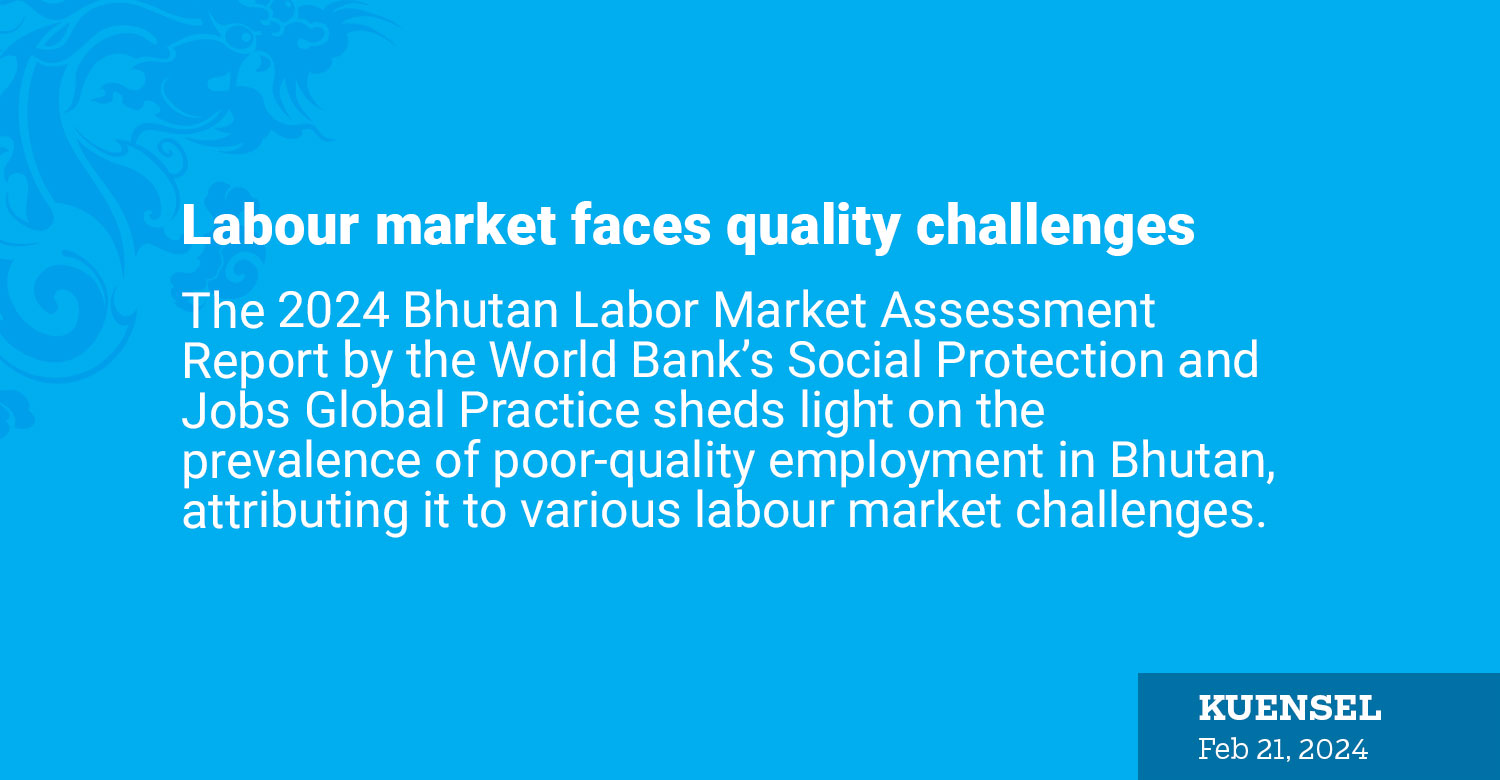KP Sharma
The 2024 Bhutan Labor Market Assessment Report by the World Bank’s Social Protection and Jobs Global Practice sheds light on the prevalence of poor-quality employment in Bhutan, attributing it to various labour market challenges.
The report focused on factors such as long working hours exceeding 48 hours per week and under-employment in Bhutan’s employment industries.
According to the report, workers in Bhutan face many challenges, including limited inclusion of women in meaningful employment and persistence of low-productivity agricultural employment.
“Employment quality outside of the public sector remains weak, leading to public sector queuing, rising unemployment among urban workers, and a record number of Bhutanese migrating abroad,” the report stated.
The report added that the private sector in Bhutan faces the twin challenges of accelerating job creation in productive sectors that can absorb the increasingly educated workforce, while also improving the allocation of labour to fill existing vacancies in low and semi-skilled positions.
Further, Bhutan’s employment support programs and delivery systems face gaps in addressing some of the challenges related to the activation of women, limited job-relevant skills, and the difficulties firms face in accessing trained labour.
When it comes to overwork, more than 62 percent of Bhutan’s workforce reported working over 48 hours a week in 2022, primarily those with lower educational levels.
Among this group, 67 percent had no formal education, while only 42 percent were tertiary graduates. Regardless of demographic factors, the main self-reported reason for working longer hours was job requirements.
The main self-reported reason for overworking, according to the report, is the job requirement, but individuals with low education and those in rural areas often work longer hours for additional income, possibly due to having a secondary occupation.
“The probability of working overtime to earn more also increases with age, suggesting the presence of subsistence issues for the working elderly,” the report stated.
On the other hand, underemployment, defined as working less than 35 hours per week, is generally low in Bhutan.
Women and workers with low education levels are more likely to work part-time, accounting for six percent of the total employment.
Women have a higher prevalence of eight percent, compared to men at four percent. Workers with no education make up seven percent, while those with tertiary education make up two percent.
However, the report stated that some workers in part-time employment express dissatisfaction with their hours, particularly in urban areas.
“Underemployment may not be a preference for some groups of workers and could likely reflect limited employment opportunities.”
One out of 20 individuals working part-time reported being unhappy with the number of hours worked and would prefer to work more hours.
The level of dissatisfaction with hours worked is particularly important for men and for workers in urban areas, according to the report.
While, underemployment is more common in manufacturing, construction, wholesale and retail trade, transportation, accommodation, and food services see a mix of underemployment and overwork.
The other sectors such as finance, insurance, real estate, and health have shorter workweeks of approximately 45 to 47 hours, with below-average dispersion.
Public-dominated sectors like education, administrative and support services, and public administration and defense have workweeks around their averages, indicating less frequency of under and overemployment.
According to the report, the manufacturing sector stands out with below-average weekly hours, but other sectors like wholesale and retail trade and accommodation and food services have longer workweeks, ranging from 56 to a maximum of 65 hours.
On the other hand, salaried workers in the public sector have the shortest and most consistent workweek, while non-agricultural self-employed and family workers, on average, work eight hours more with a standard deviation exceeding 20 hours.
The report stressed that addressing Bhutan’s labour market challenges requires pursuing vertical growth policies that are sector-specific to support private sector development and job creation.
“In parallel, horizontal reforms that improve the business environment, strengthen human capital accumulation, and increase the effectiveness of employment support programs are needed.”


